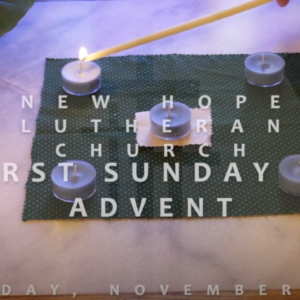Mark 13:24-37
[Jesus said:] 24 “In those days, after that suffering,
the sun will be darkened,
and the moon will not give its light,
25 and the stars will be falling from heaven,
and the powers in the heavens will be shaken.
26 Then they will see ‘the Son-of-humanity coming in clouds’ with great power and glory. 27 Then the Son-of-humanity will send out the angels, and gather the elect from the four winds, from the ends of the earth to the ends of heaven.
28 “From the fig tree learn its lesson: as soon as its branch becomes tender and puts forth its leaves, you know that summer is near. 29 So also, when you see these things taking place, you know that the Son is near, at the very gates. 30 Very truly I tell you, this generation will not pass away until all these things have taken place. 31 Heaven and earth will pass away, but my words will not pass away.
32 “But about that day or hour no one knows, neither the angels in heaven, nor the Son, but only God. 33 Beware, keep alert; for you do not know when the time will come. 34 It is like someone going on a journey, who leaving home and putting the servants in charge of their own work, commands the doorkeeper to be on the watch. 35 Therefore, keep awake—for you do not know when the lord of the house will come, in the evening, or at midnight, or at cockcrow, or at dawn, 36 or else coming suddenly, the lord may find you asleep. 37 And what I say to you I say to all: Keep awake.”
—————
Please pray with me this morning, church:
God of Hope,
Stir up your power,
And break in to our world.
Restore hope in our hearts.
Help us embody that hope
To a hurting world.
Amen.
—————
What do you hope for?
What’s giving you hope?
When things are really, really bad…when it feels like things can’t get any worse…where do you find hope…?
On this 1st Sunday of Advent, we’re being brought into explorations of hope. And I have to be honest with you, hope is one of those things I struggle with. Not because I’m a particularly distressed or despairing person, but because I try to view the world honestly. Like, I’m an optimist, but I’m also a realist, and sometimes my realist side takes the driver’s seat for far longer than it should.
Hope is something I struggle with because I tend to take an unvarnished view of the world, and truthfully, friends, I often don’t like what I see… And I suppose maybe that’s just the world we live in.
But it’s hard. And it weighs you down sometimes, right?
Maybe this is true for you, too.
It’s true for most of our world and for most of our history. Because while we humans are capable of great beauty and good, we’re also responsible for some of the most horrific and ugly chapters in our global story. And it can be really difficult to muster up even just a bit of hope in the face of so much hurt and pain.
That’s really true in the biblical narratives, too, by the way. Our verses from Isaiah and the Gospel of Mark are both written to a people and communities experiencing tremendous hardship and a profound sense of lost hope.
Isaiah 64 comes from the 3rd block of writing under Isaiah’s name, probably written 200 years or so after the original prophet Isaiah, but is written to an Israelite people who had recently returned from their exile in Babylon. They had returned to Jerusalem to find that the city they left was no longer the city that remained. They were now the outsiders. Their practices and their customs and their ways of worship were the ones being called into question. They had been forcibly removed from their home, made to live in exile in a foreign land for at least a generation, and now they were allowed to return only to find that they weren’t the ones in power anymore. They had their agency taken away from them.
And the gospel of Mark, the earliest written gospel account, is written in the immediate aftermath of the destruction of the second temple in Jerusalem. And if you’ve still got your Bibles open or the Bible apps on your phone pulled up, take a look at the first part of Mark chapter 13:
“As Jesus came out of the temple, one of his disciples said to him, “Look, Rabbi, what large stones and what large buildings!” Then Jesus asked him, “Do you see these great buildings? Not one stone will be left here upon another; all will be thrown down.” And when Jesus was sitting on the Mount of Olives opposite the temple, Peter, James, John, and Andrew asked him privately, “Tell us, when will this be, and what will be the sign that all these things are about to take place?”
This whole chapter in Mark is talking about the destruction of the temple in Jerusalem, and the temple was the center of religious and social life, so its destruction would have felt like the end of the world to Mark’s audience. And so the people in these 1st-century Christ-believing Jewish communities are left wondering if they’re next, right? Like, if the temple—if God’s dwelling place on earth—can so easily be toppled, what chance do God’s people…what chance do any of us…have to possibly avoid the same destruction?
Things were utterly hopeless.
And maybe…as you look around you today…as you watch and read the news…maybe you feel the same…
I’ve learned a new term in this pandemic: doomscrolling. Doomscrolling is when you obsessively scroll through your Facebook and Twitter feeds consuming article after article after quick-bite after update of negative and doom-and-gloom news. It’s like the trainwreck or car wreck you can’t look away from. You know the stats. You know the case numbers and death rates. You know the negativity. But still, you scroll. And it barrels you into a really unhealthy mental space and kind of a despairing place.
It can leave you feeling so hopeless…
The verses we heard from Isaiah this morning are some of my favorite in the whole Bible. From the very 1st verse: “Oh that you would rend the heavens and come down!” (Your bible probably says tear open the heavens, but sometimes only the King James translation says it just the right way for this old soul…)
I love this word rend. The Greek word is schizo; it’s where we get schism.
It’s the same word used to describe when the prophets rend or tear open their garments in distress and mourning. It’s the same word used later in Mark to describe the curtain of the temple at the moment of crucifixion. Interestingly, it’s also the same word used at the beginning of Mark to describe the heavens opening up at Jesus’ baptism…
It means a shredding of something. To rip something beyond the ability to repair it. It’s a permanent fracture. You can put a thing that’s been rent back together again, but it won’t ever be repaired…it won’t ever be the thing it was before…at least not in the same way.
It’s a completely new thing.
In these verses, the prophet gives voice to our own pleas. We implore God…we beg God…to rip apart, to tear to shreds the very fabric between earth and heaven…
We beg God to violently enter our world because if God’s entrance isn’t violent, isn’t unmistakably noticeable, we might miss it for all the violence, death, and destruction we’ve already got going on in our world.
There’s a sense in which only God can save us from this mess that we’ve got. Maybe you feel like that. Have you sat back at any point during the past 8 months and thought, “Well surely things can’t get any worse…” and then things totally get worse? Have you sat back at any point during the past 8 months and thought, “Well, I hope Jesus is coming back soon, because that’s the only way we’re getting out of this mess!”
Rending…tearing apart…is a sign of ending, of distress and mourning and fracture and brokenness…but along with it, we carry the hope and promise of what comes next, church.
God specializes in repairing brokenness, in wiping tears from eyes, bringing newness from things that are worn out, and most certainly in bringing life from death.
God is doing a new thing…if we have eyes to see it.
It’s precisely into these moments where all feels lost that the prophet and Jesus try to speak a word of comfort.
“Keep watch,” Jesus says. “All of these things—the suffering, the gloom, falling stars, and shaken powers—these are the warning signs. But pay attention…when you see these things, know that the Son of humanity is near…”
And that noticing is almost imperceptible. You have to really be looking for it. “Learn a lesson from the fig tree,” Jesus says. “Just as the branch becomes tender…and the leaves start to bud…”
For all of our doomscrolling…for all of the negative and end-of-the-world news we consume…how much time do we spend looking for those tiny signs of hope?
Hope is small, dear friends.
It’s not always big and flashy. We don’t always get the glaring neon sign proclaiming: Hope Found Here!
If hope is something to be noticed, it stands to reason that we need to be looking.
Advent is a time for waiting and expectation, but we don’t wait idly or passively. We know what’s coming in a few short weeks, church. The Christ—the Light of the world—will once again break through the night and be born again in our midst. How are we preparing? What are you doing to make the world ready to receive this incredible gift again this year?
Practice awareness and attentiveness with me this season, church.
Practice nurturing hope with me.
What is God doing here in this place? Where are the bright spots that God is calling New Hope to live into? In a time of such great need, we know that the opportunities for generosity will be exceptional. How will you practice generosity this season, church?
How can you create hope this season?
Notice the light breaking through the cracks of night.
It starts small, like a tree just starting to blossom, but the light will soon burst forth like the dawn.

